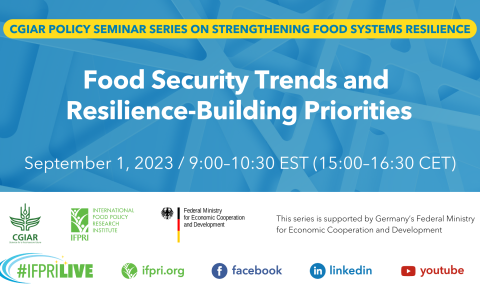Global hunger has been on the rise, largely as a result of various crises—persistent conflicts, severe climate impacts, and food insecurity. More than half of all food insecurity people live in countries affected by conflict. Together, conflict and food insecurity can create a vicious cycle, as food scarcity leads to market disruptions, which lead to further decreases in food availability and greater disruptions. Climate shocks can have similar impacts on food security. Food crises are also triggering involuntary migration.
IFPRI researchers work to break this vicious cycle by identifying crisis triggers—from climate change and natural disasters to price fluctuations and weak government structures—to better inform food security policy and other social protection policies and programs. Other research focuses on developing longer-term food security strategies that can increase resilience and reduce crises and forced displacement. IFPRI is part of the Food Security Information Network (FSIN), a technical platform that produces the annual Global Report on Food Crises. IFPRI’s research on crises and migration is closely aligned with the Sustainable Development Goals (SDGs), including SDG 1, SDG 2, SDG8, SDG 10, SDG 11, and SDG16.
When women hold local office: Women’s representation and political engagement amid conflict and climate shocks across Africa
Promoting a bundle of biofortified seeds and agricultural inputs in northeastern Nigeria
Rapport inventaire, les systèmes alimentaires au Sénégal
Myanmar Agricultural Performance Survey (MAPS) dry season 2023: Agricultural input markets, credit and extension services
Stressors and resilience within the cassava value chain in Nigeria: Preferred cassava variety traits and response strategies of men and women to inform breeding
LDCs, agriculture, and food security
Third National Fadama Development Financing II Impact Study Household Survey in Adamawa
Third National Fadama Development Financing II Impact Study Household Survey in Bauchi
Third National Fadama Development Financing II Impact Study Household Survey in Borno
Third National Fadama Development Financing II Impact Study Household Survey in Gombe
Third National Fadama Development Financing II Impact Study Household Survey in Taraba
Third National Fadama Development Financing II Impact Study Household Survey in Yobe

Issue Post Responding to Malawi’s impending food crisis
 Series/Special EventJun, 11 2024
Series/Special EventJun, 11 2024Famines and Fragility: Making humanitarian, developmental, and peacebuilding responses work
 IFPRI Policy SeminarSep, 26 2023
IFPRI Policy SeminarSep, 26 2023Facilitating Anticipatory Action with Improved Early Warning Guidance
 IFPRI Policy SeminarSep, 7 2023
IFPRI Policy SeminarSep, 7 2023Market Concentration in the Grain Industry: Implications for Food Security?
 Series/Special EventSep, 1 2023
Series/Special EventSep, 1 2023Food Security Trends and Resilience-Building Priorities
 Series/Special EventJun, 22 2023
Series/Special EventJun, 22 2023IFPRI’s 2023 Global Food Policy Report: Rethinking Food Crisis Responses – Considerations for Africa
 Series/Special EventJun, 19 - 20 2023 (Jun, 18 - 20 2023)
Series/Special EventJun, 19 - 20 2023 (Jun, 18 - 20 2023)2023 Global Food Policy Report: Rethinking Food Crisis Responses South Asia Launch and Panel Discussion
- In the News
The return of the rice crisis (Financial Times)
- In the News
Food and biofuels in debate (Agri Dees)
- In the News
Food security at risk as prices soar (Bloomberg)
- In the News
Global Commons Stewardship (NHK World)

Rob Vos
Director, Markets, Trade and Institutions (MTI)
Alan de Brauw
Senior Research Fellow
Clemens Breisinger
Senior Research Fellow
Olivier Ecker
Senior Research Fellow
David Laborde Debucquet
Senior Research Fellow
Sikandra Kurdi
Research Fellow and Country Program Leader, Egypt








